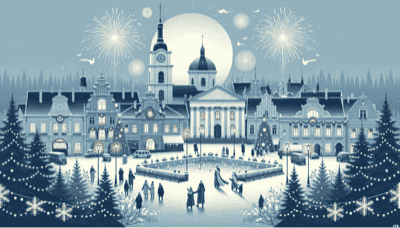We're here to help you keep count of the days to or since a date. Just click the button below and enter your chosen date to get started. Also choose the suggested days or search for a special day above #countingthedays

History and Traditions: New Year's Eve, known in Lithuanian as "Naujieji Metai," is a festive time that marks the end of the old year and the beginning of the new. Rooted in both ancient customs and more modern traditions, it symbolizes renewal and hope for Lithuanians.
Historically, some Lithuanian New Year's customs have pagan origins, reflecting the agrarian past and reverence for nature. People would perform rituals to ensure good harvests and ward off evil spirits. Over time, as Lithuania became more influenced by Christianity and Western traditions, New Year's Eve celebrations began to resemble those found throughout Europe.
Contemporary Celebrations: On New Year's Eve, Lithuanians engage in a variety of activities:
Fireworks: Like many countries around the world, Lithuanians enjoy fireworks at midnight. Major cities like Vilnius, Kaunas, and Klaipėda often have organized displays.
Parties and Concerts: Many people attend parties with family or friends or go to concerts or public events held in city squares.
Feasting: Traditional foods are prepared for the occasion, such as dishes that are thought to bring luck for the coming year.
Television Programs: Special TV programs are broadcasted throughout the evening counting down to midnight.
Fortune-Telling: Some still practice old fortune-telling customs on this night to predict what the coming year will bring.
New Year Resolutions: As in many cultures, Lithuanians make resolutions for self-improvement or goal-setting for the new year.
New Year's Eve in Lithuania is a blend of contemporary celebration with hints of historical tradition—a night for looking back at the past year’s achievements and challenges while welcoming new beginnings with optimism.